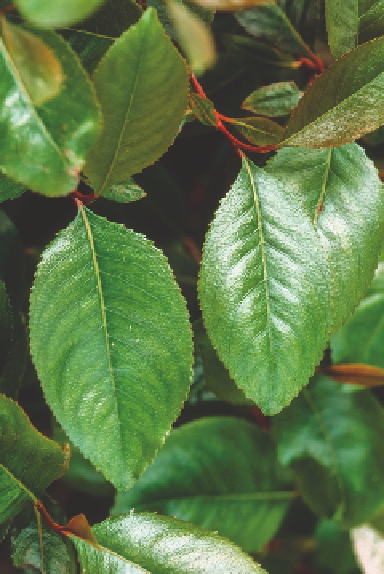Agriculture Reference
In-Depth Information
activity, and the crude stem bark extracts caused a drop in blood pressure in rats, which was dose
dependent. The stem extracts also exhibited no abortifacient activity in pregnant mice and no appar-
ent toxicity to the animals. Methanol, acetone, and water extracts of the stem bark showed sig-
nificant inhibition against a number of Gram-positive and Gram-negative bacteria. Tests of a root
extract showed only modest levels of cytotoxicity.
1140
CATHA EDULIS
Botanical Name —
Catha edulis
Forsk
Synonyms —
C. forskalii
A. Richard,
Celasterus edulis
Va h l.,
Methyscophyllum glaucum
E. &
Z.,
Dillonia abyssinica
Sacleux
Family —
Celastraceae
Common Names —
Khat, kat, Abyssinia kat, African tea, Arabian tea, Boesmans tea, bush-
man's tea, cafta, ciat, chrinda redwood
African Names —
Kikuyu: Kambo: mira, miraa; Rungwe: Msuruti, msuvuti; Shambala: man-
dama, mfeike, m'mke; Shona: muysawhare, muzaramashawa; Somali: mulungi; Swahili: mlonge
Description —
Catha edulis
is a small tree in its cultivated form, but in the wild state the plant
can grow to a height of 25 m. The plant is polymorphic, with the branches having either opposite
or alternate leaves. Khat leaves are brownish green and leathery, with a glossy upper surface. They
have a faintly aromatic odor and an astringent and slightly sweet taste. The mature leaves are usu-
ally 1-4 cm wide and 5-10 cm long with a serrated edge and are elliptical or lanceolate in shape.
Anatomical differentiation of the species is often unreliable, and the use of chromatographic iden-
tification has been advocated.
383
Habitat and Distribution —
It is a native to Somalia, Ethiopia, and Djibuti. It is a savanna crop
and prefers dry elevated regions.

